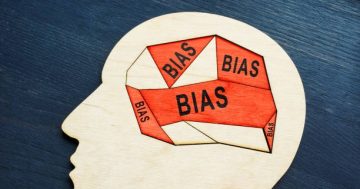Travis Bradberry* gives examples of unconscious biases that lead us to act in ways that are inconsistent with our values and beliefs.
 The human brain produces more than 50,000 thoughts each day and 100,000 chemical reactions each second.
The human brain produces more than 50,000 thoughts each day and 100,000 chemical reactions each second.
With this amount of processing power, you would think our judgment would be highly accurate, but that’s far from the case.
Our judgments are often inaccurate because the brain relies on cognitive biases over hard evidence.
Cognitive bias is the tendency to make irrational judgments in consistent patterns.
Researchers have found that cognitive bias wreaks havoc by forcing people to make poor, irrational judgments.
A Queensland University study found that blonde women earned, on average, seven per cent higher salaries than redheads and brunettes.
A Duke University study found that people with ‘mature’ faces experienced more career success than those with ‘baby’ faces.
‘Baby’ faces were defined as those with small chins, wider cheeks, and bigger eyes.
‘Mature’ faces were those with bigger chins, narrower facial features, and smaller eyes.
A Yale University study found that female scientists were not only more likely to hire male scientists, they paid them more than female scientists.
It’s highly unlikely that the people in these studies actually wanted to pay blondes more money, enable people with mature faces to succeed at the expense of those with baby faces, or hire male scientists disproportionally and pay them more money.
Our unconscious biases are often so strong that they lead us to act in ways that are inconsistent with reason as well as our values and beliefs.
Let’s explore some of the most common types of cognitive biases that entrench themselves in our lives.
The decoy effect
This occurs when someone believes they have two options, but you present a third option to make the second one feel more palatable.
For example, you visit a car lot to consider two cars, one listed for $30,000 and the other for $40,000.
At first, the $40,000 car seems expensive, so the salesman shows you a $65,000 car.
Suddenly, the $40,000 car seems reasonable by comparison — the decoy being the $65,000 car that he knows you won’t buy.
Affect heuristic
This is the human tendency to base our decisions on our emotions.
In a study conducted at Shukutoku University, Japan, participants judged a disease that killed 1,286 people out of every 10,000 as being more dangerous than one that was 24.14 per cent fatal (despite this representing twice as many deaths).
People reacted emotionally to the image of 1,286 people dying, whereas the percentage didn’t arouse the same mental imagery and emotions.
Fundamental attribution error
This is the tendency to attribute situational behaviour to a person’s fixed personality.
For example, people often attribute poor work performance to laziness when there are so many other possible explanations.
It could be the individual in question is receiving projects they aren’t passionate about, their rocky home life is carrying over to their work life, or they’re burnt out.
The ideometer effect
This refers to the fact that our thoughts can make us feel real emotions.
This is why actors envision terrible scenarios, such as the death of a loved one, in order to make themselves cry on cue.
Confirmation bias
A tendency to seek out information that supports our pre-existing beliefs.
We form an opinion first and then seek out evidence to back it up, rather than basing our opinions on facts.
Conservatism bias
This leads people to believe that pre-existing information takes precedence over new information.
The ostrich effect
Aptly named after the fact that ostriches, when scared, literally bury their heads in the ground.
This effect describes our tendency to hide from impending problems.
For example, if your organisation is experiencing redundancies, or you receive negative feedback, it’s common to attempt to push all these problems away, rather than to face them head on.
This simply delays the inevitable.
Reactance
Our tendency to react to rules and regulations by exercising our freedom.
Tell a teenager to do what you say because you told them so, and they’re very likely to start breaking your rules.
Similarly, employees who feel mistreated by their employers are more likely to take longer breaks and extra sick days.
The halo effect
This occurs when someone creates a strong first impression and that impression sticks.
For example, teachers grade a student’s first paper, and if it’s good, are prone to continue giving them high marks even if their performance doesn’t warrant it.
The horn effect
This is the exact opposite of the halo effect.
When you perform poorly at first, you can easily get pegged as a low performer even if you work hard enough to disprove that notion.
Planning fallacy
This is a tendency to think that we can do things more quickly than we actually can.
For procrastinators, this leads to incomplete work, and this makes type-As over-promise and under-deliver.
The bandwagon effect
The tendency to do what everyone else is doing.
This creates a kind of group-think, where people run with the first idea that’s put onto the table instead of exploring a variety of options.
Bias blind spot
If you begin to feel you’ve mastered your biases, keep in mind that you’re most likely experiencing the bias blind spot.
This is the tendency to see biases in other people but not in yourself.
Recognising and understanding bias is invaluable because it enables you to think more objectively and to interact more effectively with other people.
*Travis Bradberry is the award-winning co-author of the bestselling book, Emotional Intelligence 2.0, and the co-founder of TalentSmart. He can be contacted at talentsmart.com.
This article first appeared at talentsmart.com.











